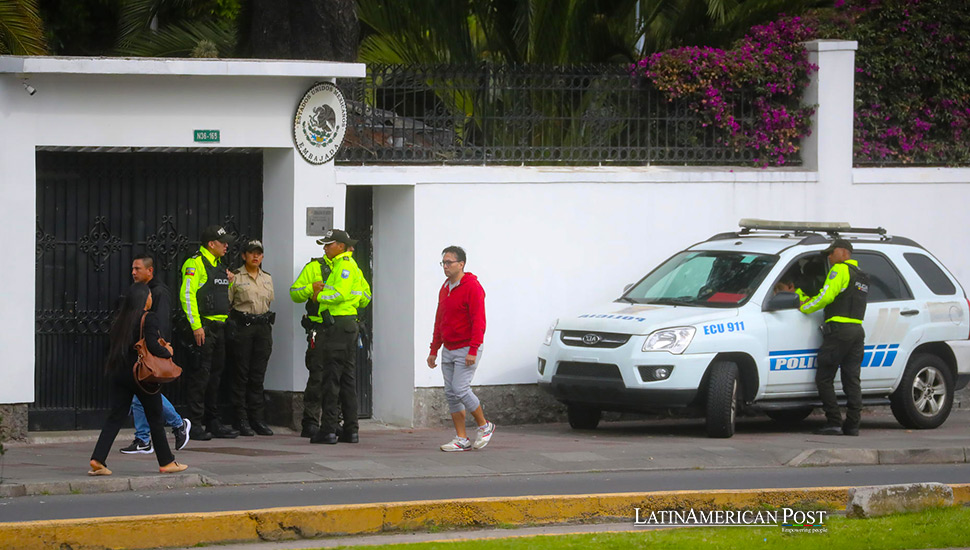Latin American Nations Decry Ecuador’s Assault on the Mexican Embassy

Following Ecuador’s storming of the Mexican embassy to arrest asylum-seeker Jorge Glas, Latin American nations, including Argentina, Bolivia, and Brazil, condemned the breach of international law, highlighting regional solidarity and the importance of diplomatic sanctity.
The recent siege of the Mexican embassy in Quito, Ecuador, where security forces apprehended Jorge Glas, the country’s former Vice President, has ignited a firestorm of diplomatic backlash across Latin America. This incident, transcending Ecuador’s borders, has become a focal point for regional discourse on the sanctity of diplomatic missions and the principles of international law.
Ecuador’s Bold Maneuver: Breaching Diplomatic Confines
In a dramatic late-night operation, Ecuadorian special forces, employing a battering ram and scaling walls, breached the embassy’s confines to arrest Glas, who is embroiled in corruption allegations. This bold maneuver came shortly after Mexico granted him political asylum, sparking international controversy and prompting a unified outcry from Latin American governments.
Argentina, Bolivia, Brazil, Chile, Colombia, Cuba, Peru, Uruguay, Venezuela, and Nicaragua have vociferously condemned Ecuador’s actions, viewing them as violating diplomatic norms. The unity displayed by these nations underscores a collective regional stance on upholding international law and respecting embassy sanctity.
Mexico’s President, Andres Manuel Lopez Obrador, decried the raid as an authoritarian act and an infringement of Mexico’s sovereignty and international law. Conversely, Ecuador’s stance, articulated by President Daniel Noboa, argues that the asylum granted to Glas is illegitimate due to the corruption charges against him. This clash of perspectives has fueled a broader debate on the limits of diplomatic asylum and the intersection of legal accountability and international rights.
The operation’s audacity and implications have strained Ecuador-Mexico relations and raised questions about the sanctity of diplomatic premises under the Vienna Convention. This international treaty, revered for its governance of diplomatic ties, asserts that embassies are sovereign entities of the nations they represent, immune to the host country’s law enforcement actions.
Global Reactions and Calls for Dialogue
Brazil’s reaction was swift and stern, with its government condemning the raid as a clear transgression of international norms. Colombia’s President, Gustavo Petro, echoed this sentiment, advocating for adherence to international law amid global tumult while signaling intentions to seek human rights protections for Glas.
The international community, including the United States and the United Nations, has also weighed in. The U.S. reiterated its stance against violations of diplomatic missions, urging a resolution that aligns with international norms. U.N. Secretary-General Antonio Guterres expressed alarm over the incident, calling for moderation and dialogue between the involved parties.
The Organization of American States (OAS), a pivotal entity in the Western Hemisphere’s diplomatic landscape, has called for dialogue to defuse tensions, emphasizing the importance of strict adherence to international treaties, including those safeguarding asylum rights.
In the aftermath of the raid, the Mexican embassy remained under police siege, its national flag conspicuously absent, symbolizing the gravity of the diplomatic fallout. Mexico’s Ministry of Foreign Affairs announced the imminent departure of its diplomatic staff and their families from Ecuador, signaling a stark downturn in bilateral relations.
Public sentiment in Mexico has been palpably agitated, with protests erupting outside Ecuador’s embassy in Mexico City, branding the Ecuadorian government as fascist. This public outcry was mirrored in the shocked reaction of Mexico’s top diplomat, Alicia Barcena, who lamented the injuries sustained by embassy personnel during the raid and defended the asylum granted to Glas after thorough deliberation on his case.
Significance and Implications
The incident at the Mexican embassy in Quito not only marks a significant diplomatic rift between Ecuador and Mexico but also serves as a litmus test for the strength and unity of Latin American countries in defending international law and diplomatic protocols. The collective response of the region’s nations highlights a shared commitment to the principles of sovereignty, legality, and diplomatic sanctity, foundational to the international order.
Also read: Ecuador’s Bold Strategy Against Crime to Jump Start the Economy: A Blueprint for Latin America?
This episode reminds us of the complexities and challenges inherent in navigating the delicate balance between upholding legal standards and respecting diplomatic norms. As Latin America grapples with these issues, resolving this dispute will likely have lasting implications for diplomatic relations and international law within the region and beyond.





